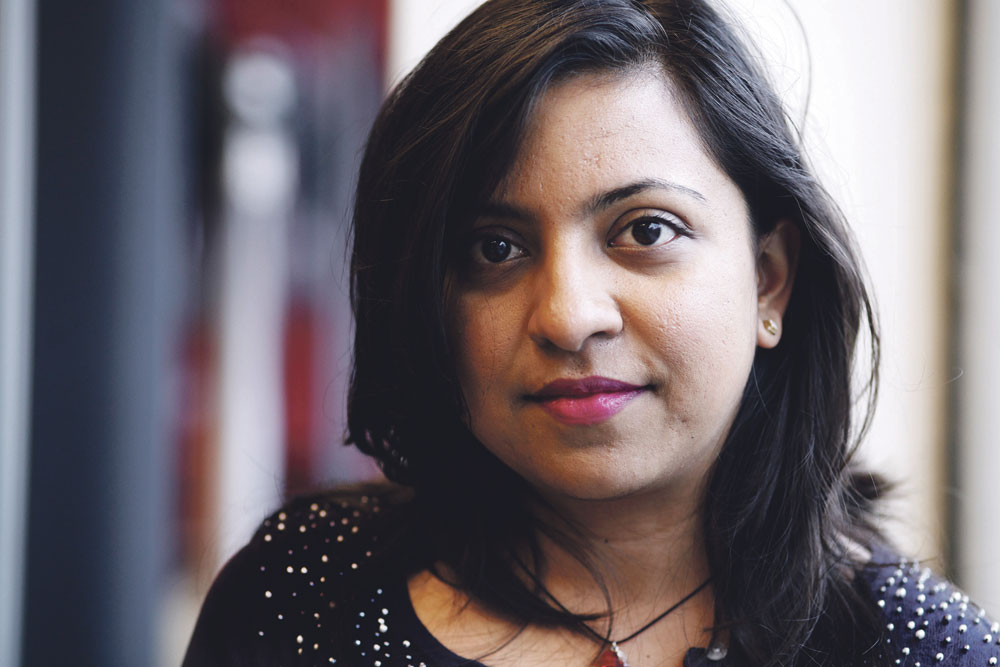Aarabi Krishnakumar (25) from India, a TU Delft electrical engineering graduate in 2010 and former Delta journalist, found her calling in the telecom sector with KPN, the Dutch mobile, television and internet giant.
How has life changed after Delft?
“It was a big transition. At university, the culture was very relaxed, I only had to care for my own targets and my time was very flexible. Now, I’m responsible for my job and this takes first priority. It’s not like an assignment that I can do the next day. I have a more formal work atmosphere with colleagues who have at least 10 years experience in the field, so the expectations are different now.”
How did you find a job?
“I had an internship with Professor Nico Baken (EEMCS). He’s one of KPN’s leading strategist and part-time professor at TU Delft. I did my internship and thesis project with KPN. When I graduated, my manager offered me a job at KPN.”
What is your role at KPN?
“I’m a designer for KPN’s Interactive TV (iTV) proposition. This means when our technical architect makes a design for the platform, I work out the details, like the impact on hardware, processes, testing platform and the time and financial budget required to implement the project. I also have a special interest in assurance process design. I support our process architect, who decides how we’re going to ensure that service faults or customer complaints are handled efficiently.”
How do you find the gender demographics in your workplace?
“In our department, we’re three women among about 40 men, so the ratio is very tilted. But at university also, my classmates were mostly male, so it’s not a new situation. Working in my environment has turned out well for me. My colleagues are very respectful and we all value each other. My boss is a woman and I get wonderful support from her. In a professional atmosphere, your sex doesn’t really matter.”
So no discrimination in being a woman?
“Not really among my direct colleagues, unless it’s positive discrimination when I’m wearing a very short skirt! Occasionally I do meet the odd person who doesn’t take me seriously, but that may have to do with my age and experience as much with my gender.”
How do you cope with that?
“Because respect is present in such a high degree in our department, I’m always able to get advice and support from an experienced colleague. This support gives me the influence I need to cope with resistance.”
Do you like living in Holland?
“There are some things in Dutch society that I really value, like straightforwardness and fairness to all, since these are also important for me as a person. I do enjoy living here, but I haven’t thought about settling down as such because I want to experience different cultures around the world.”
And you speak Dutch fluently now.
“Yes, KPN’s official language is Dutch, so I hear it throughout the day, which really helps in picking it up. I’ve had to take Dutch lessons very regularly. Knowing Dutch has helped me enormously. Now I feel more involved with the community, and interactions with Dutch society have become easier. A new language opens up a new world. I recommend it to everyone.”
You were once a freelancer for Delta. How does it feel to be on the other side of the table now?
“Very cool. It’s satisfying, because the culture of writing and the newspaper still survives. I used to be the person asking questions, but now the spotlight has changed. It feels special that my name has moved from journalist to the feature.”
What are your future plans?
“My immediate plan is to be able to swim, ride a horse and learn to sail! Professionally, I have two choices: I can specialize as a process designer or grow towards being an enterprise architect. At the end of 2013, I’ll have an evaluation with KPN. Based on that, and what I feel like doing, we’ll see if I stay on or not.”
Any wisdom for young graduates?
“Learning Dutch helps. Also, women are in demand in technical fields because the ratios are badly skewed in the workplace. There’s nothing but opportunities everywhere.”
Het moest even bezinken bij student Martin Fiala, maar zijn Act of Folly was op dinsdag 19 april toch echt het winnende ontwerp bij een prijsvraag van studievereniging Stylos. Die wil een folly – een klein bouwwerk dat geen gebouw is – op het plein voor Bouwkunde. Het wordt een sculptuur van zeilen aan kabels met daaronder zitplekken voor studenten. Fiala noemt het een ‘symbolische paraplu’ en open platform voor ontmoeting.



Comments are closed.